|
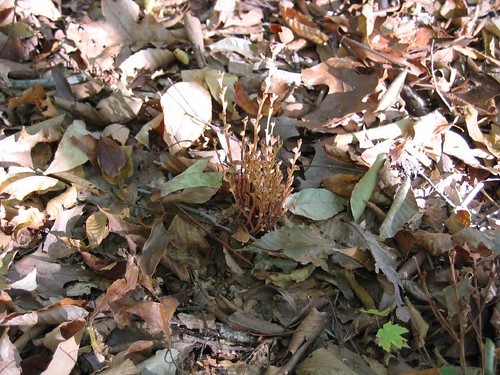
Epifagus virginiana, beech drops. Franklin, TN.
(*photo credit)
November 1, 2013 Honor the Unsung Saints
At various times in history some think too much honor is given to certain individual "saints." Granted, the special attention can lead to possible excesses of personal piety; in fact, this can verge on superstition such as burying statues of St. Joseph upside down in order to gain a home sale. However, piety towards saints for the greater part is sparse, not excessive in our modern materialistic culture. Rather, we ought to give special attention to those workers and faithful souls doing good deeds in life who are often forgotten after they pass away. Saints of all stripes deserve greater, not lesser, honor.
Honor comes in many ways. First, we ought to speak well about people who are easily overlooked and their stories are well worth telling, especially to youth in dire need of good models to follow. On All Saints Day, the good and often forgotten deeds of our ancestors in the faith deserve a mention on Twitter, Facebook, and email, or in face-to-face conversation. Today we each can share with another someone who cared for others during their lifetime (see August 12th when we mentioned the death of Becky Simpson).
Honor comes through respect. Let's simply recall beloved deceased relatives and friends who were instrumental in our lives, who we neglected to give special affection and gratitude to while they lived -- and we now pay back in the communion of saints. Perhaps a more positive sign of respect may inspire those who forget anniversaries or who show little gratitude. We compensate for our past neglect and forgetfulness through public admiration of others' fidelity and courage. Honor incorporates respect -- something that our rather informal age seems to overlook too often.
Honor comes in living history, a narration or writing about folks who have since taken a back seat to the popular stars that shine brightly for a moment and then pass on. The new is not necessarily the better; many older deeds are worth recording, but we soon realize that a narrative of written or spoken history (talks, videos, and writings) takes more effort than creating fiction. On the other hand, real history is more interesting.
Honor is in memorials and public displays. Keeping up cemeteries is a simple November-type practice. In Kentucky, one can start a cemetery at one's choosing and there are many of them. The creation of burial spots has an ultimate drawback since many of these private graveyards are easily forgotten and abandoned. Visiting graves is respect; so is cemetery upkeep.
Honor comes in prayer for, and even to, those we are sure have found special favor with God. They are more able to speak on our behalf. Having favorites among the ranks of the unsung helps empower our growing faith, for saints stand close to the Almighty.
Prayer: Lord, we thank you for many saints in our world, some
of whom we were privileged to meet and know.
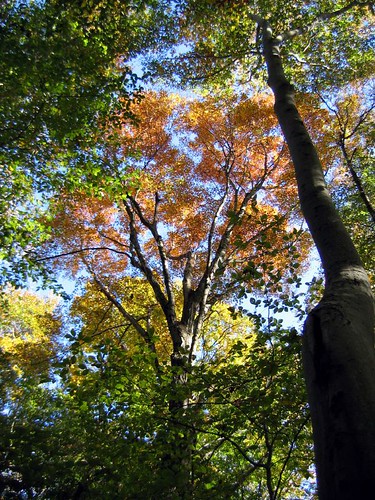
Autumn colors in Appalachian Kentucky.
(*photo credit)
November 2, 2013 What about "the Hour of Our Death"?
On All Souls Day we turn attention to mortality. This year my only godchild was told that if her partner of twenty years did not get his leg amputated due to recurring blood clots, he would only live another two weeks. His wish was that no extraordinary means were to be taken to prolong life, and his loved ones judged that a removal of a major limb was extraordinary. The decision was definitive but still painful; the wait until the inevitable death occurred was even more so. Each day many tortured loved ones await the hour of death of some beloved soul. What about our own supreme hour? Is that what we pray in the Hail Mary when reciting "now and at the hour of our death"?
Awaiting certain death can be a blessing. Shakespeare says that cowards die many times before their death. Perhaps a few fearful souls view every circumstance as a possible life-threatening event. That's different from those who really are ill, or condemned prisoners, waiting for an approaching hour that seems impossible to postpone. It is the awaited hour of hours, the time when the curtain falls on our mortal journey. Such experiences have blessing attached, for it is not unexpected death by accident or earthquake. The victim has time to prepare for what is coming.
Awaiting death remotely has merit. A dying person is highly focused on important matters. Little things blur; or does it include a morbid envisioning of how one will look at the coffin viewing? People do want to pass respectfully. Beyond immediacy is a more spiritually remote preparation, and the passing of a loved one is a valuable lesson for us to do just that -- a prudent making ready for the inevitable. Let's not pretend; death is as certain as taxes. The reality of living includes that of dying as part of the natural cycle in which we are part.
Waiting is easier when seen as a transformation. Failure to speak of death or presenting it with the rawness of THE END can be extremes of denial or despair about future eternal life. The hardness of the unbeliever is strikingly discomforting to the true believer in future life. Our Christian liturgical prayers speak of a passing from this life to the next and that this is more a transition from one form of life to another. It is the sure belief that Christ through his resurrection has conquered death. We die but do not die, for this is changing from mortal to eternal living.
Awaiting with others can be shared faith. We feel a kinship with all believers who also believe that this is change and not a definitive end. Awaiting with others a happy death can be a community event with all learning from the courage of the one passing, a moment of gratitude for the gift of life. It enhances our respect for what is mortal as well, and gives new meaning to healing our wounded Earth.
Prayer: Lord, allow us to await with others their passing with compassion for loved ones left behind; turn our sadness to joy.
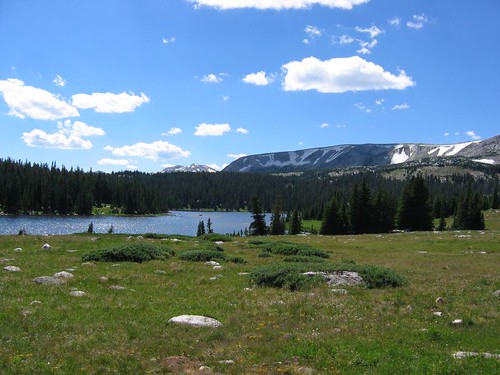
Blue skies at Sugarloaf, Medicine Bow, WY.
(*photo credit)
November 3, 2013 The Lord Desires Salvation for All
The Son of Man has come to seek and save what was lost.
(Luke 19:10)
The story of Zacchaeus reveals a theme that runs through the Gospels from Luke's Infancy Narrative to the Ascension, namely, all are meant to be saved. Today we hear that Jesus invites Zacchaeus who willingly accepts the invitation; he was regarded as a lost sinner by his overly righteous culture. Here we see Jesus presenting the saving power of God. Like Zacchaeus we need God's saving grace to help heal us and our wounded Earth. Zacchaeus is disliked as sinner and overlooked due to his small physical stature. However, he seeks to compensate by climbing a tree to see the passing Jesus; he responds to the Lord's invitation and accepts the opportunity to show hospitality and promises extended charity.
Today, the poor and destitute are all too often overlooked and regarded as outside of the participatory process of renewing our wounded Earth. God's plan means ALL and that includes them. We are all to be hands and feet of the mystical Lord acting as a team of servants working together. It takes more than money and physical resources to bring about profound change, though that is not recognized by a secular materialism. Those who donate money are regarded as having more spiritual power, but do they? A lending hand depends on a degree of love, not a dollar amount.
The sufferings and efforts of the poor become an integral part of the ongoing Calvary event. Through willingness to enter this community of suffering, we the poor become more like Jesus in his suffering and death -- an act that is part of the divine invitation to us who either are suffering passively, or making an active effort at renewal. The Good News is that all can participate in their own way, that it does not take special gifts or material possessions to exert the power coming through faithful activity. Oneness with the Lord is solidified through love and devotion.
Participation covers a wide range of human conditions: it includes those who take an active part in remedial work, publicize needed activities, engage in political action to change the structures, and halt the culprits who inflict damage on our neighbor; it also includes the dying, ill, imprisoned, and shut-ins, those unable to do active work and yet willingly offer their sufferings up for others as an act of love.
Earth herself suffers and undergoes her own travail; she is our suffering companion to which we enter into the expanding community of the suffering. Recognizing this is part of a grander participation. We are other christs acknowledging Earth's state of impoverishment and recognizing a potential for resilience through our giving new life. In joyful union, we suffer together and become more closely bound as one entire family.
Prayer: Lord, help us bring back to life that which is thought to be lost, so that all might be glorified in and through you.
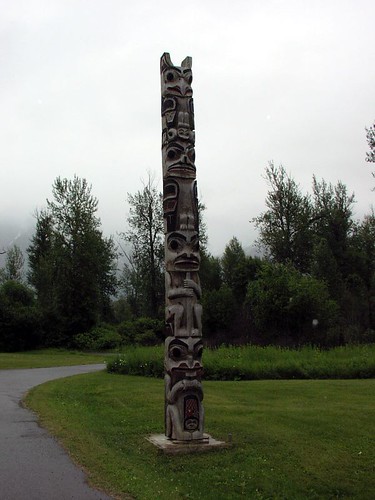
Totem near Prince Rupert, Canada.
(*photo credit)
November 4, 2013 Is it Near the End of Electric Utilities?
The title question is not mine but that of Lewis Milford in the Huffington Post on July 26th of this year. Will electric utilities go the way of black rotary phones and daily print newspapers? Actually there are a number of reasons that make us motivated to answer in the affirmative:
* Many new off-the-grid customers are now willing to exchange their own surplus electricity with needs at different times -- and structures emerge to support this. When ASPI started an off-the-grid solar house in 1978 we anticipated a future that has come;
* High cost of new power plants and infrastructure appear. Investors are far slower than in past to risk funds for what may not be profitable pay-backs. U.S. nuclear facilities with eight billion dollar price tags are virtually a thing of the past, nor are smaller nuclear units proven effective and safe;
* Lower priced renewable energy alternatives are the accompanying reason that entices people to invest in their own home or community wind, solar, and geothermal resources. Prices are coming down rapidly and are cost competitive with fossil fuels, especially for windpower and on the way for solar;
* The utilities realize that public support of clean energy includes relatively rapid development by all levels of government friendly to new rate structures. This encourages "distributed energy" or energy created off the grid;
* New technologies enhance grid-independent, e.g., battery storage, lower cost solar PVs, and micro wind turbines. Improvement plus reduced costs mean the plunge is not too daring as in times of a decade or so ago;
* Grid systems rise in cost through increased environmental regulations, normal maintenance of aging infrastructure, storm damage repair and insurance rates, and other factors related to violent climate change conditions. A more decentralized system may work to the betterment of all in this changing climate;
* Environmental costs mount after a history of fossil fuel use, especially coal-generated electricity from dirty power plants. No one likes to be labeled "anti-environmental," and so larger systems both are to blame and bear the general public's dislike for air and water pollution in the past; and
* Consumer repugnance to higher utility bills is always a factor and, with wind becoming competitive, this will be a drive to make grids a distribution rather than a primary generating system.
"The threat to the utility model from disruptive forces is now increasingly viable" says a recent Edison Electric Institute report. The reality will feed on itself; going off-the-grid reduces overall revenue and leaves troubles in maintaining overall mega-systems for reduced numbers of customers. However, the grid will be around for some time and public support as a safety backup is bound to remain as part of a safety valve to the energy system.
Prayer: Lord, teach us to see a future that is better and to
help usher it in through renewable energy promotion.
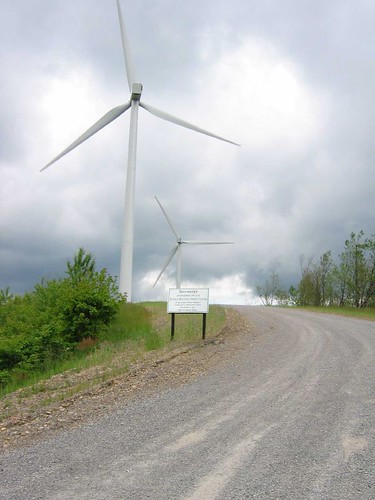
Buffalo Mountain Windfarm, Tennessee.
(*photo credit)
November 5, 2013 Is Wind Power Blowing in Fast Enough?
On Election Day we wonder about our national environmental and conservation policies at a time of global climate change. The renewable energy picture is rosy but so is the expansion of natural gas exploitation within the conventional fossil fuel energy economy. An unexpected competition by plentiful fracked fuels has become a major drawback for promoting environmentally benign renewable energy --wind, solar, hydro, tidal, geothermal and certain biofuels. Generally renewables have been higher priced than conventional fossil ones (coal, petroleum, and natural gas), and the massive increase in fracking operations in our country has driven down natural gas prices to new lows.
However, wind power has certainly been blowing. In mid-summer the U.S. Department of Energy reported that in 2012 wind energy became the number one source of new U.S. electricity generation capacity (a $25 billion dollar investment representing 43% of all new electric additions). This means a 13-gigawatt (GW) addition of new wind power to the national grid, far exceeding the previous year and giving a total capacity of 60+ GW and enough to satisfy annual energy needs of 15 million homes. Since the turn of the century wind energy capacity has made a 22-fold increase. The capacity is expected to rise 19% in 2013 and 7% in 2014. Nine states have wind power that supplies more than 12% of needs and three (Iowa, South Dakota, and Kansas) over 20%. From the domestic standpoint over 72% of the turbine equipment has been produced by domestic sources. Wind is simply becoming cost effective.
Improved developments in wind power generation continue along with growing volume of equipment production and lower maintenance costs of more durable turbines. Wind is certainly more than competition if all environmental costs for fossil fuels were factored into the final electricity costs -- but they never have been. Wind-generated electricity is at an all time low. However, generation is not keeping up with growing demands due to all the new domestic consumer devices now coming into use. Thus, low natural gas costs exceed these lowering wind prices and so this segment of the fossil fuel energy economy remains somewhat intact.
Over all, the American energy picture is in flux. From an environmental standpoint many nuclear powerplants are reaching their 40-year expected life service; at least four have closed this year. The total environmental benefits of fracked natural gas are still disputed. Coal powerplants are being converted to natural gas; solar is coming on strongly from a low base; geothermal has initial investment problems but is emerging with a stronger showing as is utilization of small hydropower units. Lower-priced wind has a bright future because highly-populated markets on the East and West coasts are near potential offshore wind sources. However, a crash national wind effort is needed to curb climate change.
Prayer: Lord, give us the insight to use resources wisely for
the benefit of all our people in our troubled world.
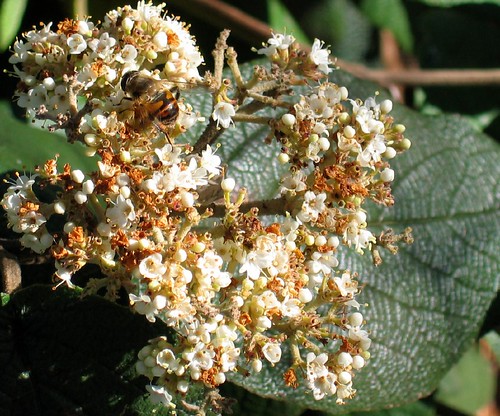
November-blooming viburnum with Syrphid fly.
(*photo credit)
November 6, 2013 Let's Celebrate Indian Summer
Indian summer is autumn now half spent,
a whiff of bountiful summertime
coming amid fading falling leaves;
It is a melancholy moment,
harking to time gone forever,
not redone -- but why should it be?
Indian summer is crystal clear weather,
allowing us to look out to the horizon
through the cluster of naked trees;
Isn't it better to look ahead than back,
lest we stumble into our past once more,
or think it better than it really was?
Indian summer means that last bit
of an ever-shortening growing season,
that fleeting passing present moment;
We take it with open hands, thankful
and knowing the present is God's gift,
only borrowed and rented, not possessed.
Indian summer is a weather event
that mirrors human life in final stance,
present but not lasting forever;
It is the foretaste, even foreshadowing
of what lives ahead as an eternity
among the changing seasons of our lives.
Indian summer in the fullness of its spell
tells us that brevity has its place
for us to take in and breathe deeply;
We are here now and pause
as the climate changing weather does,
hoping that worse things won't arise.
Indian summer is a promise
that what was good is still good
even if changing again tomorrow;
Celebration is the better thing to do
because our full living is worth exalting
and opens us to new life. Rejoice!
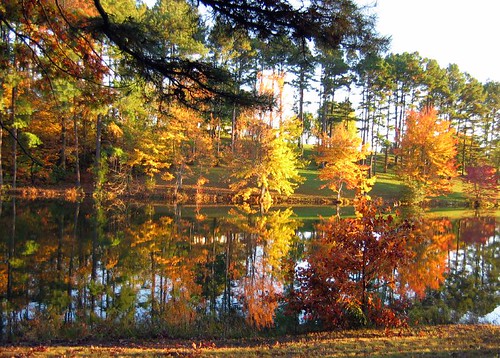
Changing leaves in southern KY.
(*photo credit)
November 7, 2013 State of the Climate Report
The National Oceanic and Atmospheric Administration (NOAA) released a 260-page peer-reviewed report in mid-Summer written by 384 scientists from around the world. For those who deny any evidence for climate change and consider it somewhat patriotic or "religious" to do so, this could be an eye-opener given the data accumulated up to the end of 2012.
Last year, if we are still not aware, was one of the ten hottest on record, with sea Arctic ice at historic lows and ocean levels as historic highs (counting only recent human civilization). Even though 2013 has not equaled the previous year's extreme conditions, still a new normal is being established which will be costly in billions of dollars of damages due to flood, hurricanes, tornadoes, and droughts. In 2012 global surface (land) temperature was eighth highest and surface sea temperature at ninth highest since record-keeping began in the late 1800s.
In 2012, Arctic sea ice (one of the most noticeable effects of global warming) shrank to its smallest summer minimum since satellite records started over three decades ago. Also 97% of the massive Greenland ice field melted at least somewhat last year. This occurs when scientists talk about the lubricating effects of this melting resulting in increased calving at the icecap edges. That melting was in 2012 four times faster than the 1981-2010 average rate. We await the 2013 figures in a few months as well.
The report adds fuel to the speculations that have been made in recent years as to increased misery for the poor inhabiting low-lying areas due to current climate change. Much of the anticipated fears of ocean rise in amount are based on melting of this massive Greenland ice cap which is in places one mile thick -- and can affect the oceans when melted. Large numbers of people inhabit these lower areas. Think of crowded Bangladesh with two hundred million people and the less populated but sovereign Pacific and Indian Ocean island nations that will be submerged.
This report only confirms trends that have been predicted and are coming true faster than originally anticipated. Prudence is the virtue in great need during these troubled times, and even the more optimistic must take note. There is no magic wand in sight. The report tells us that the urgency expressed in these reflections is real and worthy of serious consideration. We hope to take heed and reduce levels of greenhouse emissions; this can be done by curbing fossil fuel use, hastening renewable energy applications, and instituting energy efficiency measures at a global level. The United States has been a major greenhouse emitter in the past and needs to take a conservation lead. The pollution "honor" has shifted to China with other developing nations not far behind. Will all polluting nations accept their global responsibilities?
Prayer: Lord, you ask us to observe signs of the times, so open our hearts to address problems affecting our troubled Earth.
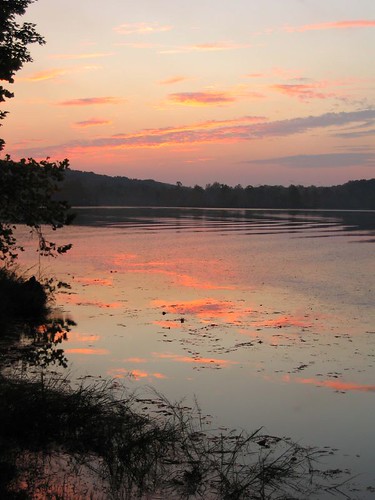
Energy Lake, Land Between the Lakes, western KY.
(*photo credit)
November 8, 2013 Fair Trade Is Part of a Healthy Lifestyle
This is the month we are focusing on Chapter Eight of Reclaiming the Commons (see Brassica Books for free download of contents). An arena of deepest concern is that of movement of people and goods in our world. As global brothers and sisters, we are deeply concerned that the poor are able to engage in that movement both in their individual lives and as communities who benefit from trade with neighbors near and far. All people need fair trade but we are often beholding to larger commercial players for global trade policy. Farming folks discover when their crops are plentiful that prices come down and then go up when all suffer from scarcity. Hard knocks to lower-income folk can be softened by governmental efforts through trade regulations.
For consumers who like coffee or chocolate, they find ways to purchase from fair trade sources; these omit profit-making middle people and allow far more funds to return directly to primary producers. Likewise, fair trade advocates seek to ensure that purchased products meet proper worker safety and environmental standards, whether the producers are small or large companies. Since the tragic fires in a building used by garment workers in Bangladesh killed over one thousand early this year, the international community is pressuring purchasers to abide by rules for workers to receive fair wages and safety in their workplaces.
A sizeable number of charitable and relief organizations have moved into fair trade practices. For instance, Catholic Relief Services promotes specific homegrown and crafted products from poorer countries. This involves direct contacts between consumer and producer through missions and other religious outlets where person-to-person contacts are easily established. The end result is the reduction of the influence of middle people who historically gain most through commerce. Instant communications is a great leveler, for consumers are able to pay less for higher quality products, and ultimate producers benefit from higher prices for their goods.
The key is access through the Internet between those who are producers and those who are ultimate consumers. Democracy ought to benefit the little guy. For example, SERRV is a non-profit fair trade and development organization helping to bring good returns from ultimate consumers to original producers. The potential for further refinement in such trade is bright through the Internet.
An added fair trade note is important. We have always supported obtaining locally-produced materials and even applaud those who drink locally-grown herbal tea over imported coffee (some like it), and such choices have much to do with tastes and preferences. While we promote local products, still some of our purchases are goods from a distance, with amounts differing from consumer to consumer. Fair trade becomes a fair option.
Prayer: Lord, direct us to be mindful of all our purchases.
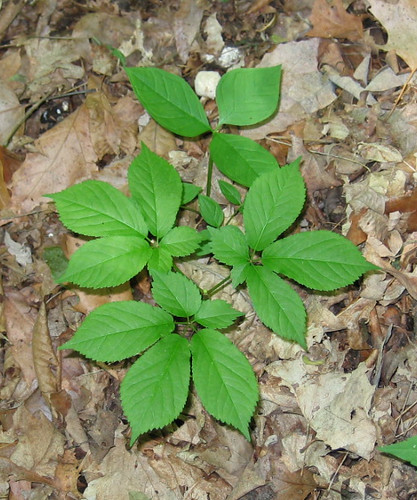
Ginseng, Panax quinquefolium Rockcastle Co., KY.
(*photo credit)
November 9, 2013 Unfair Trade in Fauna and Flora
Global population growth has resulted in decline of forested and wilderness areas as well as available "bush meat" from threatened wildlife. On an equally dangerous scale, the rise of the middle class in developing countries has triggered a market for animals' parts (e.g., pets and medicinals from rare species) as well as plant species and parts (exotic plants and timber from rain forests). In Daily Reflections we have mentioned bisons, passenger pigeons, seals, elephants, hippos, whales, ginseng, and rain forest products. Profits drive the unscrupulous to exploit and pillage -- and it accelerates when regulations are absent or unenforced.
The combination of poor folks who see this exploitation as added income, to richer people who see profits at the expense of the environment is a repeated tale of woe continuing into these supposedly enlightened times. It is a fruit of an excessive and uncontrolled capitalism that has spawned exploitation for five hundred years and is in need of control. Some misinterpret this continued exploitation as part of their supposed mandate to conquer Earth. However, such conquests are counter to the Judeo-Christian messages of care and respect -- and yet promoters neglect the nuances associated -- for bashing Judeo-Christianity is more popular than the harder effort required at curbing exploitation.
Today, poachers harvest wildlife because lucrative world trade allows such practices to go unenforced. Purchasing ivory from elephants is not a mere luxury but a criminal offense -- and all parties must be considered liable. The Convention on International Trade in Endangered Species of Wild Fauna and Flora (CITES) was drawn up in 1973 to protect wildlife from exploitation, and to prevent international trade in threatened species. The U.S. is a party to this treaty, which has proved to be an effective vehicle for protecting these species through severe trade restrictions and commercial penalties. A major environmental problem is failure to enforce existing global regulations-- and it is not too soon to bring them into effect through trade sanctions and interceptions in the trading routes and commercial activities.
Animals are not the only threatened species. Forests are under threat from slash and burn as well as wanton and rapid overharvesting of both temperate and tropical areas -- though the rate has slowed in recent years by conscientious efforts on the part of many countries. Forest Products Certification (funded by extraction fees) can ensure that forest products are properly harvested, processed, and utilized. However, protection often depends on testimony of harvesters who have devastated forests through improper practices. Policing at points of harvest and transport would curb excesses, but this is a major challenge in poorer countries. Endangered forests deserve global trade enforcement of regulations as much as endangered animals.
Prayer: Lord, give us the courage to monitor the enforcement
of regulations that ensure health of our wild plants and animals.
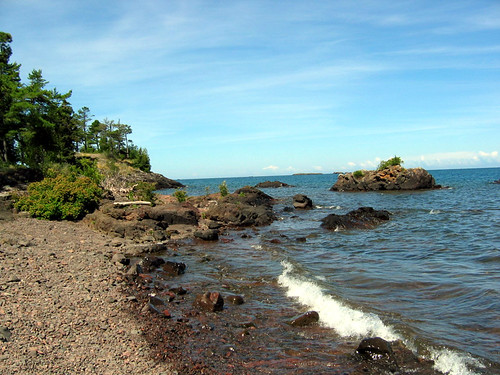
Agate beach, Eagle Harbor, MI.
(*photo credit)
November 10, 2013 Encouragement in the Midst of Adversity
Pray that the Lord's message will spread quickly and be received with honor as it was among you. (II Thessalonians 3:1)
When we reflect in the month of November on the four last things (death, judgment, heaven and hell), we need to pray for courage for ourselves and others. None of us find it pleasant to dwell on the last things too long though it may be a good November exercise. Courage is needed when the leaves fall and the weather turns for the worse. We do not like to admit being frightened by change, and death or judgment are just that. The Good News is that the Lord will give this courage to those who ask for it, and it is all for the asking. We are only humble sowers of Good News and not the reapers of the harvest; we are mere instruments and not master growers. Some words fall where they do not receive honor and grow; others fall on fertile grounds and bear manyfold.
In today's Gospel (Luke 20:27-38) we find the Sadducees, who claimed no resurrection of the dead, really uttering a tale of woe and death, not a culture of life as found in Christ's words and deeds. In contrast to a despairing mortal finality to our life, Jesus affirms an afterlife for the just when they will be free from further death. He promises that we are destined for a state of eternal freedom as sons and daughters of God. If no resurrection, then as St. Paul says, our faith would be dead and nothing to look forward to. Those with no future leave a fading mark in this changing world that grows fainter with time; those with a future leave an eternal mark of permanent love woven into the fabric of a New Heaven and New Earth.
The hope of Resurrection enlivens us and gives us a vista beyond an eternal horizon. All people, believers and non-, suffer the ultimate letting go of life; all will experience the last things for we are all mortal. For Sadducees, nothing beyond is worth considering; for believers with more in store have an enthusiasm or the God within. Belief in the future informs our way of acting. Our faith comforts us even in times of adversity, for better things will certainly occur. We look beyond illness and shortcomings that are surely in the pathway to future glory, for these can be overcome in our confidence in Christ's presence.
Faith transcends the cynicism that confronts Jesus in today's account by Luke -- and confronts us in our everyday lives. We discover a world struggling to come to some meaning in life and seeking a sure ground for that meaning, a ground in time and a time that looks to the future -- to eternity. A promised change is profound as Jesus indicates in today's reading, far beyond current knowing. The Gospel invites us to do more than prepare ourselves at a personal level. We are called to affirm the resurrection with an enthusiasm that this belief engenders within us.
Prayer: Lord, give us the courage to be of help to others in times when the secular world sees little or no future.
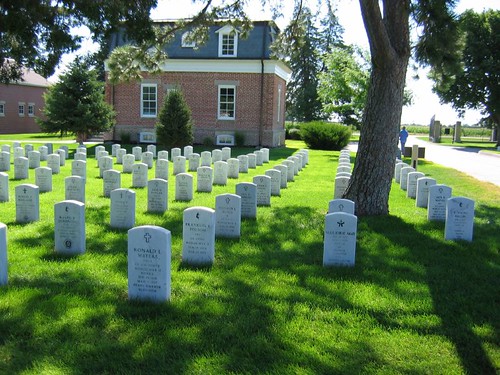
Sunlight and shadows, Ft. McPherson, Nebraska.
(*photo credit)
November 11, 2013 Take Pride in Local Veterans
Veterans, especially those demanding just compensation or health services, are all around us. Veterans, especially those from unpopular wars are in need of extra kindness -- for their experiences can prove dispiriting for them. This occurred to many war veterans who had sacrificed much after the Revolutionary War and in more recent times after the Vietnam War. For they gave up much and risked their lives and then upon returning to civilian life were not honored for their services. Respecting these brave souls is the least a grateful nation ought to do, whether in hindsight the reasons for the war itself were not perfectly expressed. Adjustment from military to civilian life was hard enough, but the burden of experiences may haunt them through life.
Many of us know those who fought in bygone struggles, some more famous and notable than others. I have sought to honor veterans of sound memory in my two parishes by videotaping their exploits for the U.S. Library of Congress Veteran's Project. However, today three of my parishioners are too old, and their records are known only to God. In a golden retirement age when memory lasts, all of us should honor local veterans with a recording for their posterity and a grateful nation. We show we care for their exploits through these more permanent recordings.
Some who fought in those wars of long ago would rather have their experiences kept private and that is their option -- and often for the good of their wellbeing. That privacy must be honored as well though we certainly are always intrigued as to why they want to remain silent. The mental weight of past war horrors is not easily lifted by time or even by publicizing experiences.
Today is a day when scouts move through military cemeteries and put little flags at each grave, marks of respect that teach the doers and all that our nation owes a debt of gratitude to those who risked or gave their lives for their country and what it stands for. With time some wars become less and less justified but not for the ones at the height of the crisis who responded to the national defense. Armchair historians would never have won battles, only the foot soldiers who did more than reflect. Some study history and some, like veterans, make it. They made decisions to go to fight, to be disciplined and endure hardships, to fight the battles, and to return and adjust to civilian life.
The collateral damage of wartime exploits has always been high -- and that cannot be denied. All veterans endured uncertainties, nervous spouses and mothers, and loved ones devoid of immediate communications for periods of time. These associated individuals are part of the veterans' sacrifice and they are also deserving of honor on this Veterans Day.
Prayer: Lord, give us a sense of honor and respect for those who sacrificed their all in times of crisis. Let us give equal time to ensuring that new conflicts do not arise requiring veterans.

Pottery shard, Navajo National Monument.
(*Photo by Alan English, Creative Commons)
November 12, 2013 Let's Be Potters Molding a Just World
Take a potter, now, laboriously working the soft earth,
shaping all sorts of things for us to use.
Out of the same clay, even so, one models
vessels intended for clean purposes
and the contrary sort, all alike;
but which of these two uses each will have
is for the selfsame potter to decide. (Wisdom 15:7)
We have just celebrated Veteran's Day and recalled the great sacrifice made by our military heroes and heroines who gave all for their country and a peaceful world. The fact the goal of peace has not yet been reached does not stop us from trying. We can continue while having breath to work towards a just world, a hope that is not lost due to individual or social imperfections.
Maybe we are to learn from those who struggle in many different ways. We can learn from potters who make artifacts that bear their imprint, but they prefer to look to the product rather than an exaltation of their creative efforts. We ask ourselves whether we are satisfied with the final result far more than being participants in fashioning that emerging world. On the other hand, isn't it just human to leave our fingerprints like potters on the artifact? This is taken from Appalachian Sensations for the month of November under the category of "touch."
Potter Molding Clay
I came upon a potter at the festival;
she was so diligent and wanted others to observe
the talented works of her hand.
I asked her whether her fingerprints would stay
on the piece that she was fashioning.
She assured me they would not,
and smiled at my ignorance.
She ran the wire under the moist clay
and set the pot free and on its own. A birth!
Is it really so bad if the fingerprint remains,
I said to myself?
For the genius was in the creation,
and this would be her own signature.
We are shaping our hearts from wet clay,
here awhile with smudging fingerprints.
All are unique for each individual,
and no other has the same features.
We are clay creations from a mighty potter's hand;
and then we fade in death's own kiln,
Glazed into a reflection of eternal light.
Will not all fingerprints remain?
Prayer: Lord, give us the grace to continue to work for a just world, and to put our soul into the sacrifice.
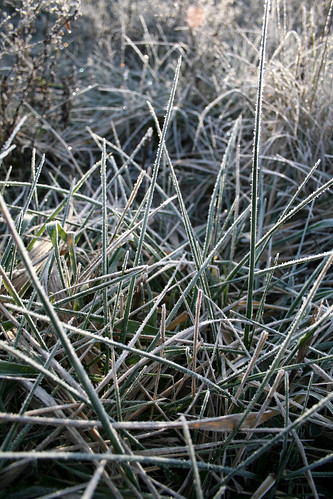
November frost, Kentucky hay field.
(*photo credit)
November 13, 2013 Legislator Pledges Are Anti-Democratic
Since most solutions to the problem of greenhouse-gas emissions require costs to the polluters and the public, the pledge essentially commits those who sign it to vote against nearly any meaningful bill regarding global warming, and acts as yet another roadblock to action. New York Times
Billionaires Charles and David Koch have inserted this "No Climate Tax" pledge that in essence says there will be no new legislation that is not accompanied by an offsetting amount of tax cuts. To date, this "No Climate Tax" pledge has been signed by 411 lawmakers; this essentially means at the national level a working minority is able to halt legislation directed at curbing any form of climate change regulations. Money will have to be forthcoming to bring about such regulations, if nothing more than salaries for the regulators. If the Big Money bosses say "no" and exert tax pledges from those who swore to uphold our Constitution, then the democratic system is compromised at the moment when global climate change means severe decline in life quality.
Why am I concerned? Because the very heart of our democracy is being placed in the hands of a wealthy and undertaxed elite driving a stake into its heart. And this is a democracy that has at its heart the saving of our world. We can no longer tolerate the stake drivers. In his amazing prescience, Benjamin Franklin saw excessive wealth as a threat to future democracy at a time of global need. A pious remark, "Oh, look how principled these good legislators are" might be cast in a totally different light: "Their working principles are tuned to Big Money donors." As all of us are to meet our Maker soon we ought to give deep thought to what lies before us. How can we leave this Earth in a worst state than when we found it, without a voice of dissent?
My rhetorical comment to the silent majority is: Why are we not speaking together as democratic people? Why allow billionaires to get away with murdering our democracy? Astoundingly, the real culprits are not the billionaires but those of us who allow the billionaires to exist as such and throw their undertaxed fortunes at retaining their noble ranks. Through silence we tolerate this system and such tolerance is wrongdoing. We allow ourselves to be influenced by the media that help retain money power by kowtowing to it. We allow the "commons" to be so corrupted by tax breaks for those who control legislators. America's original revolt, "Taxation without representation," is now cast by a newly minted rebellious people slogan: "Fair taxes through representation."
Healing of Earth consists of discovering the troubles and addressing them not as individuals but as a voting public demanding that those elected act in a democratic spirit. A climate of consuming less resources only occurs in a society that controls unnecessary spending and spends what it takes to govern properly.
Prayer: Lord, give us the courage to speak up and to act.
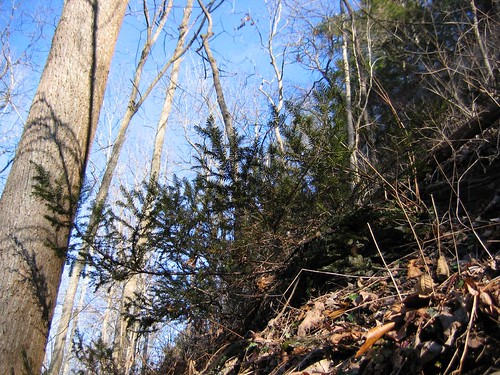
Evergreen cluster of Taxus canadensis, uncommon Kentucky plant.
(*photo credit)
November 14, 2013 Sounds of November Challenge Us
Every season has its sounds and they are different depending on where we live. With frosting and falling leaves we get some clearer sounds that were muffled earlier in the year and they may prove welcome or not. Some people enjoy train whistles and youth shouts at football games. It allows them to know they are not alone but have company in a world where silence wears on their nerves. For others, the opposite seems to be the case, and so November can become a noisy month that adds to its gray tone.
The same sounds can resonate with us as music or they can disturb us as unwanted noise. We try to live with the times and places but it can be trying -- at least for those of us with full hearing. It all comes down to the art of listening to what we want to hear and to blot out the disharmony that can bother us. Thus the art ultimately rests in discriminating and focusing on what adds to our quality of life. The fullness of environmental work for a just world is to allow all to have their times and places where sounds and silence can add to quality of life -- and this is a challenge.
From Appalachian Sensations: A Journey through the Seasons
we quote this November selection --
---------------------------------------------
November -- The Haunting Bay of the Coon Hounds
Acclaim YHWH, all the earth,
serve YHWH gladly
come into the divine presence with songs of joy!
(Psalm 100:1-2)
In the distance we can hear them bark and move about
restlessly on cool autumn evenings. They're our companions giving a chorus of their excitement. Don't dogs sing in their own way? Our speech has a certain Appalachian character to it ‑‑ a twang, a dialect, a way of talking. Even the region's dogs have their own distinct way of barking. Yes, coon hounds are really Appalachian, and so are many less descriptive mixed-breeds as well. We detect a lilt to animal sounds and know this is their way to acclaim and serve the Most High. But we don't stand over others as strict rulers; we show leadership by giving them service; we go ahead of them not in a sense of triumphal greatness, but knowing full well that as serving people we help them form an honorable procession of all creatures. Dogs are our chosen companions who reconnoiter the procession path. Coon hounds are our Appalachian cavalry; their yaps announce their coming. And any self-respecting coon knows how to behave at the proper time and place.
------------------------------------
Prayer: Lord, teach us to welcome the seasons, to accept what is delightful, and be able to endure the rest with a smile.
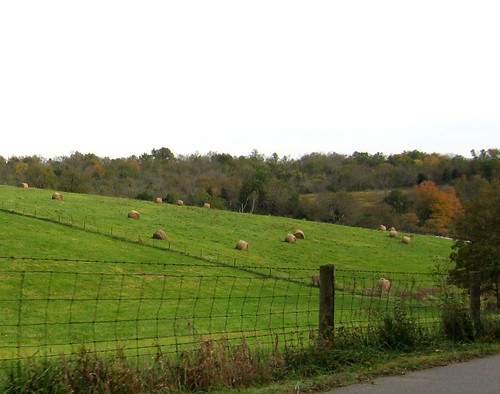
"Rural outskirts, Fayette Co., Kentucky.
(*photo credit)
November 15, 2013 Consumerism: A Good or Bad Term?
In the course of my life I have used "consumerism" in either of two ways, one good and one pejorative. However, of the six times Daily Reflections considered consumerism, the bad outweighed the good. Yes, we are all consumers and must act ethically in the manner and selection of consumer items from food and clothing to electronic devices, cars, and housing. When I started public interest work, some consumer advocates asked me to devote attention to consumer products much in the fashion of Ralph Nader's attention to faulty automobiles. However, the "consumerism" issue had an ambivalence attached: attacking shoddy, unsafe and fraudulent practices is a civic duty; exposing excessive consumer "demand," want, and purchasing within our materialistic culture is really a pastoral duty due to effects on our spiritual life.
Ethical consumerism -- This concern focuses on the rights of those who buy to get what they paid for, and have safe products that use less resources and can be disposed of properly. Responsible consumer buying includes a deep concern about how ingredients are properly measured, identified, and warning given as to possible misuse. It is the world of Consumer Reports. Purchasers have a right to get what they pay for and to have proper legal recourse when not satisfied. Cheating in measurements is as old as human commerce and governmental regulations are needed to ensure that what is purchased is listed with correct amount and ingredients. Advertisements, especially directed to infants and youth, lead to purchase of high-priced, sugary cereals and sports clothes. Planned obsolescence is programmed into new product introduction. Here ethical consumerism deals with vigilance and proper response to misdeeds perpetrated by unscrupulous perpetrators. Proper consumerism involves governmental regulation of commerce accompanied by consumer/citizen vigilance.
Excessive consumerism -- More attention has been given in recent years to upper and middle class people with additional spending money used to consume unneeded or luxury products, or to hastily move from one product to a slightly improved one -- all to enhance the profits of producers and sales people. Much attention must be given to consumers being deliberately duped into thinking they have new needs. This applies from air conditioning to the latest Internet device: excessive food leads to obesity; excessive domestic heat is oppressive in winter and excessive cool air in summer is harmful to health; inefficient vehicles are costly to driver and the planet; and excessive purchasing leads to a junked up environment. Credit cards give the notion of putting off payment to a later time; well publicized sales lead to panic buying when the greedy trample down timid bargain seekers. Excess is a curse affecting human spiritual health and Earth's viability.
Prayer: Lord, teach us ethical consumerism and vigilance as charity for neighbor's wellbeing. Help us experience excessive consumerism as a temptation to be addressed. Teach us to be satisfied with enough and make sure the enough is high quality.
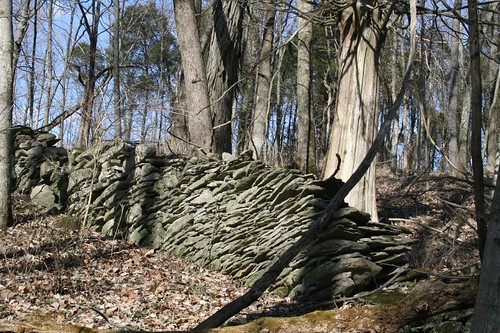
Central Kentucky "stone fence".
(*photo credit)
November 16, 2013 Slave Liberation: Propertied America Take Note
In mid-summer, when speaking about the "Our Father's" phrase I spoke about it as our duty to assist the Lord in giving all their "daily bread." In this discussion, I said that bread is a form of livelihood, and that we are pro-life; being so, we must be willing to assist in allowing all to exercise their right to life through the dignity of earning their daily bread. Workers are willing; the work is more than enough; but financial resources to bring this about are salted away in the 30-trillion dollar tax havens that need as much liberation as do slaves. One couple walked out and called me a "communist." C'est la Vie!
My response to name-calling (since I am a fiscal and social conservative and believe in adequate private property for everyone's basic livelihood) is that excess of anything is wrong. Excessive food or drink turns people into gluttons and drunkards; excessive auto speed is dangerous; excessive property is likewise detrimental to the democratic spirit. It inflates a sense of money power that turns citizens into autocrats and allows some to be far more influential than average citizens (something Ben Franklin saw as destructive of democracy at the time the Constitution was being framed). However, money people won out then, and these moneyed ones have often held the upper hand in our struggling democracy. Amazingly, the Constitution framers struggled with property and so slave trade (a property issue) was discussed. Within four score years this festering slave property question morphed into a bitter Civil War with its Emancipation Proclamation and Constitutional Thirteenth Amendment -- and 650,000 dead citizens.
In this century, accumulation of vast financial resources occurring in hands of fewer people has accelerated. Now, the common good is deeply affected, for wealth is removed from the commons and held by fewer "property holders." The Holy See has championed the need for international financial controls and regulations -- but the call is weak globally. We the faithful must speak out even when some misunderstand the problem or dislike a possible solution so opposed by wealthy nobles. Excessive property is a problem that must be tackled, but can it be if legislators are paid by the wealthy to keep laws to their own benefit? And poor lottery players dream of a wealth with little odds of success.
Excess is the greedy dream of immature adults bent on possibility of excessive consumption. A rising middle class seeks affluence of a greater degree, forgetting that materialism is never satisfying. It only brings further pollution and waste of resources meant for the poor and future generations. One answer is "Save the souls of the rich through fair taxation." Help the unemployed who call for sound livelihood -- and who could and do foment global insecurity. How many of the Muslim Brotherhood in Egypt are unemployed young people? We must address excessive property issues for this is the planet's unfinished revolution.
Prayer: Lord, give us courage to give all their daily bread.

Unconditional love of farmer's pet.
(*photo credit)
November 17, 2013 Remaining Steadfast in Uncertain Times
And when you hear of wars and revolutions, do not be frightened, for this is something that must happen but the end is not so soon. (Luke 21:8b)
We are never certain about what tomorrow or what even the next moment will bring. The likelihood is that we know about the future with some degree of certitude but it is still probability. In an age of instant communication, we get rumors that spread quickly from one place to another. This ever-compressing neighborhood makes us all the more aware that something apocalyptic is emerging and can arouse millions in minutes. Christ's repeated admonition through the storm at sea and on Easter Sunday is more poignant: Do not fear! Some try to frighten others as an exercise of power. However, prophets of doom don't know what's coming; only God knows.
In response to troubled times we are called to be steadfast as expressed by St. Paul (II Thess. 3: 7-12). We are to remain even tempered and balanced during times of chaos and uncertainty. We ought to avoid two extremes: doing nothing and allowing others in the community to support us while we await the end; or becoming overly nervous and busybodies who want to take charge through meaningless activity. Expecting a calamity brings on stress and loss of energy, and so we seek to flee from those prone to panic. Our steady pace shows a willingness to find God as our rock and Christ as our stronghold amid all adversity.
No doubt we know from the surging evidence that future calamity is beyond the horizon as windows of change close on climate change. Can we avoid catastrophe? Is the ancient funeral song correct in it being a terrible day -- Dies Irae (Latin for "Day of Wrath")? Yes we are to prepare for a judgment to come. We live and breathe and still have fleeting time. At this moment, our freedom calls for sound judgment. While we cannot deny the current situation, we do not have to be paralyzed by fright nor idle through accompanying excuses; we do not have to seek to escape to false allurements as busybodies distracted from the work at hand.
Steadfastness in our faith comes through partaking in the Eucharist, our presence with the Lord during troubled times. We discover the Lord to be our rock and companion not just today but every day as a "Day of the Lord." As willing servants, we thank God for calling us in these times and to enter into the struggle with courage and even temperament. Thus, in the face of personal or social calamity we still exude an air of gratitude, not just as we want to participate in a Thanksgiving event, but as an everyday exercise of our fidelity to the Lord. Our life is a special gift, and so is the work and prayers that we can do and give; this is a time of promise and not of wrath and we must have the courage to say so.
Prayer: Lord, give us the courage to face what is coming with
our eyes firmed fixed on your presence in our midst.
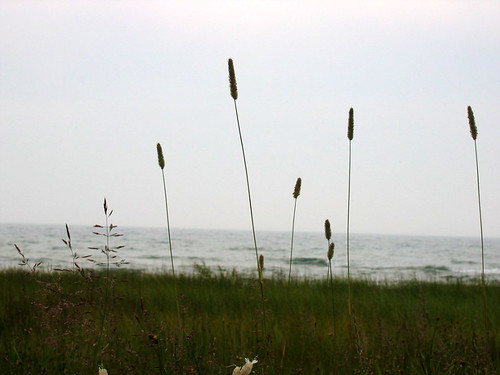
Shoreline view, Manistique, MI.
(*photo credit)
November 18, 2013 Excessive Methane: Blessing or Curse?
Methane is a gaseous chemical component of the natural cycle of decomposition and decay (the major component in marsh gas), and yet its excessive liberation through modern human activity has become a major environmental problem. In fact, it is regarded by the USEPA as the second most prevalent greenhouse gas emitted in the U.S. from human activities. Methane is twenty times more powerful than carbon dioxide, the number one greenhouse gas. Methane is an emissions product of a variety of human activities: natural gas and petroleum systems (30% of methane emissions), livestock waste 9%, landfills 17%, coal mining 11%, wastewater treatment 3%, and enteric (intestinal) fermentation (23%). Inventory of U.S. Greenhouse Gas Emissions and Sinks: 1990-2011.
Today, with increased fracking of natural gas deposits in shale rock, methane has been designated as the "good guy on the block" in comparison to coal and tar sand -- its dirty fossil fuel cousins. It also outdistances worrisome nuclear fuels that are unsafe and demand highly expensive power plants. One difficulty with fracking is that it may perhaps be less damaging than using coal, but it keeps us bound within the fossil fuel economy from which we must liberate ourselves ASAP. Some softening of methane impact occurs through proper livestock manure management; another is to burn emissions from landfills as fuel.
Note that the largest source of methane in the environment is the processing of natural gas and petroleum, and yet USEPA estimates are imprecise and data is incomplete. Drilling, processing, and transporting of natural gas along with seeping methane emissions after well closure could generate sizeable quantities of escaped gas. Furthermore, the cheapness of this new fuel source makes some drillers less concerned about leakage that USEPA estimates as 2 to 4% of total withdrawals. If these percentages of escape prove higher, methane is NOT a good coal substitute due to the high climate change potency of methane.
An added wrinkle in the fossil fuel debate is that methane is also a worrisome gas in coal mining (11% of total methane emitted) -- and reduced coal mining means less of this gas escaping from coal seams. In fact, the reduced methane escape in coal processing could make methane still more favorable as a fossil fuel of choice. However, this reasoning only prolongs the transition from fossil fuels to renewable (wind, solar, etc.) energy; in those the greenhouse emissions occurs only in manufacture of equipment and NOT in energy production. Very little greenhouse gas emissions also occur when using hydropower, geothermal, or tidal energy, though biofuels have combustion carbon dioxide emissions. Renewable energy substitution and greater energy efficiency are the greatest relief from methane generation or escape, and this is where the focus ought to be.
Prayer: Lord, teach us wisdom in choice of energy uses and to see that we must always seek the more prudent way of acting.

Natural assortment of autumn leaves.
(*photo credit)
November 19, 2013 Reflect on Lincoln's Gettysburg Address
This is the 150th anniversary of Lincoln's famous address at the dedication of a military cemetery at the Gettysburg Battlefield site in Pennsylvania. Let's recall his words and reflect on the impact of the concepts when our nation was in its deepest crisis.
ADDRESS
Fourscore and seven years ago our fathers brought forth on this continent a new nation, conceived in liberty and dedicated to the proposition that all men are created equal.
Now we are engaged in a great civil war, testing whether that nation or any nation so conceived and so dedicated can long endure. We are met on a great battlefield of that war. We have come to dedicate a portion of that field, as a final resting place for those who here gave their lives that this nation might live. It is altogether fitting and proper that we should do so.
But in a larger sense we can not dedicate -- we can not consecrate -- we can not hallow -- this ground. The brave men, living and dead, who struggled here, have consecrated it far above our poor power to add or detract. The world will little note, nor long remember, what we say here, but it will never forget what they did here. It is for us the living, rather, to be dedicated here to the unfinished work which they who fought here have thus far so nobly advanced. It is rather for us to be dedicated here to the great task remaining before us -- that from these honored dead we take increased devotion to that cause for which they gave their full measure of devotion -- that we here highly resolve that these dead shall not have died in vain -- that this nation, under God, shall have a new birth of freedom -- and that government of the people, by the people, for the people, shall not perish from the earth.
Reflection notes:
1. The message was mercifully short (269 words) versus a previous long-winded preliminary address mostly forgotten today;
2. The words were to the point, having mentioned the sacrifice just made and the benefits of those who gave all for their country;
3. A sense of gratitude for what has been achieved pervades the text throughout the short speech for the sacrifice of those who really consecrated the site by their lives;
4. The words are hope-filled with a message to the audience or the living to give our lives in service for others just as the fallen heroes had done; and
5. The address was all inclusive, bringing in a shared vision of, by, and for the entire people.
Prayer: Lord, teach us to choose words of gratitude, hope, and inclusiveness so that we may inspire others to great things during this time of national and global crisis due to climate change.

Skunk in the garden.
(*Photo by Oliver Hill, Creative Commons)
November 20, 2013 Honor the Skunk or Polecat
Each month we highlight some form of flora or fauna that is familiar and worthy of our special attention. The lowly but still beautiful black-and-white stripped skunk or polecat (a few of other colors) comes to mind this month because they move about even during the winter months when other mammals are in hibernation. The ever-searching skunk is known more for its distinctive odor than its beauty and inquisitive nature as it surveys our domestic sites whenever possible. Unfortunately, in its journeys around the neighborhood it crosses or prefers to use highways and along with possums become major contributors to "road kill." Hardly a week goes by without observing a dead polecat on the local roads I travel.
In Appalachia, the polecat finds refuge in our many forested region. Their odor is truly distinctive and is their simple weapon of defense against larger carnivores. Virtually every frisky country dog has tangled with a skunk once (only once) in his or her career. People find these beautiful wildlife creatures make amiable pets and so they have them denatured. Skunks are certainly loyal to the "master" and are opportunistic enough to know when another will feed them on a regular basis. Wild ones love to venture into residential areas and swipe cat or dog food when available. Skunk appetites seem to cover a vast gamut from insects of all sorts, lizards, frogs, and birds to carcasses of wildlife. But their tastes also extend into the plant kingdom with a diet of fruits, nuts, berries, leaves, roots, and grasses of a wide variety. They are also known to eat honey bees. What an appetite!
The beauty of these little beasts can make nature lovers hate to see their unfortunate loss on highways. My suspicion is that roads have a relatively warmer and smoother surface and it is easier for the roaming skunk to take to the highways. Once past immature stage they seem to be solitary, living with a wide range of space with the males, being polygynous, covering a broader range of territory. They do make dens or burrows and are known to cluster together in colder climates (their range is well into much of eastern Canada as well as the U.S.) in winter months to keep warm.
No one wants to tangle with skunk spray, so please stay clear when observing wild ones. On occasions our more immature dogs would attempt to contact or even fight with a skunk. We applied grapefruit or tomato juice to kill the scent that could remain for days if unattended. Other pet owners advise cheaper methods but I hope you will not have such unfortunate skunk aroma, for its presence remains for weeks on your pet, your vehicle, your home, or yourself if unattended.
Prayer: Lord, you give us a wide variety of wildlife that are able to beautify our landscape and make life all the more interesting for all of us; give us also the grace to respect them and keep our distance.
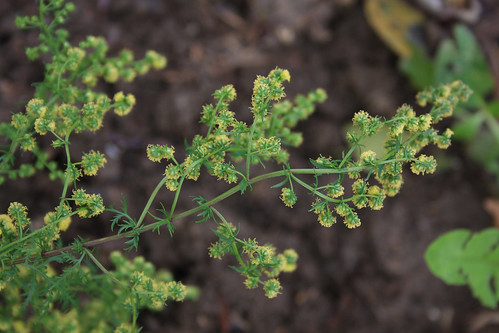
Developing seeds of the Artemisia annua, Mercer Co., KY.
(*photo credit)
November 21, 2013 You Know You are Getting Old When...
* You thank God for each morning's sunrise and feel good that you survived the night;
* You can't remember whether you said this before -- even a short time before;
* You fail to recall whether the clock means "am" or "pm", and so you look outside to see whether it is daylight or dark;
* You find the tools used on the farm when you were young (seed jobber, hay hooks, corn sheller) being displayed in the state agricultural museum;
* You regard virtually everyone as a youngster -- certainly the President and even the Pope;
* You consider the practice of learning a new word every day as getting to be "old hat," and fewer choices are now available -- if really new words;
* You discover that prayer gets harder to say in words and just becomes an exercise of sitting with the Lord just as loved ones sit silently on front porches;
* You enjoy new foods but are unsure whether they are new, or your tastes have forgotten;
* You lose count on your fingers and give up counting with your toes;
* Your next conversational point really doesn't matter or at least the listener has moved on to something else;
* You are convinced that birthdays are coming way too fast and so it is better to ignore them;
* You still remember someone who remembered the Civil War (ole Joe Davis), but virtually no one else to share the experience;
* You simply can't accept the kind invitation to play pickup basketball when walking at the local park for fear of a heart attack -- and that might disturb the intensity of the game;
* You favor obituaries as the best local news and then discover that virtually all are younger -- however, on an optimistic note those dying my age seem to be getting fewer;
* You let God do the accounting for you because those whom we promise prayers could get overlooked by the ongoing press for new intentions;
* You introduce yourself one more time to someone who smiles and said you did this several times before -- and you acknowledge that this is an ongoing habit;
* You check whether your shoes are simply on and not just lace-tied -- and the same thorough check holds to whether you have your pants on;
* You have something very important to say or write today and now you don't know what it is or whether you placed it on a note in a prominent place;
* You put reminder notes everywhere and then they become so many you are unable to sort them out; and
* You say -- "Thank God for good memories of the past, for these are like fragile and precious gems."
Prayer: Lord, if nothing more, help me to repeat "thanks."
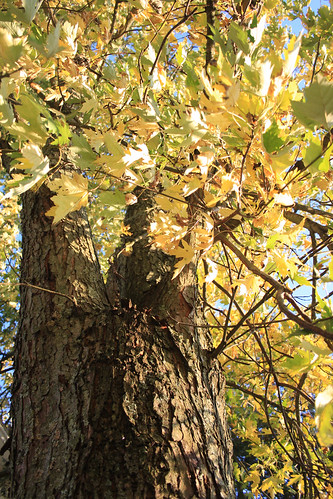
Fast-growing silver maple, Acer saccharinum, age ca. 50 years.
(*photo credit)
November 22, 2013 Where Were You 50 Years Ago Today?
For three-fourths of the human race this question makes little sense, but for those of us who are older and retain some memories it does. I recall the exact spot (my location was in a chemistry laboratory that no longer exists) when the news first struck us that President John F. Kennedy had been shot. In a fit of prayerful desperation I remarked to lab mate Frank Creegan, "I think Kennedy has been killed and they are not telling us yet." The dirge music was followed in a half hour by the announcement that he had passed way -- and a nation went into mourning.
Such imprinting of time and place has few repeats in my lifetime, and even to some degree the death of loved ones, some of whom we were more or less expecting. Perhaps we were convinced that President Kennedy's mission was just beginning with his administration having great things in store. The time and events of the next few days after his being shot likewise remain vivid in ways few other spans of time have done: the swearing in of Lyndon Johnson; the presence of sorrowful wife Jackie; the assassination of Lee Harvey Oswald actually on TV screens; the salute of tiny son John-John at the funeral; the global leaders who came like tall, stately Charles DeGaulle; and the horse-drawn procession from St. Matthew's to Arlington Cemetery. The nation was stunned and all schools closed. It was truly a world event, and they reported that people cried in the streets in New Delhi, India.
Shocked people talked and talked, and some thought the event was a conspiracy. President Johnson established the Warren Commission to investigate and found that Oswald and his assassin Jack Ruby both acted alone. However, theories lingered for years in books and articles. Perhaps the shock involved great expectations now crushed by a cruel Dallas gunshot. The youthful exuberance of those three John Kennedy years suddenly turned a hero for some into a universal idol. His presidency had not proved itself yet and it was over. JFK certainly was still a rough unpolished diamond, and many overlooked the blemishes and even later disclosures; he stood for high ideals in the midst of the Cold War, and he had a knack of saying things (perhaps due to a good speech writer) in crispy ways that were memorable and stirring. We sorely missed his youthful enthusiasm.
That event of fifty years ago marked us to some degree; we aged and had to mature in ways never expected. What seemed to be promising, such as a new civil rights crusade was to have its dark moments and killings before light at the end of the tunnel. The war in Vietnam grew in intensity and took the nation by storm and divisiveness with its massive body counts and returning coffins. In some ways one never recovers from the death of a loved one, and in a real sense I for one had pinned high hopes on Kennedy, perhaps too high. And that makes this a very special day.
Prayer: Lord, help us find solace in knowing that deaths can
be milestones in life, and no one dies in vain.
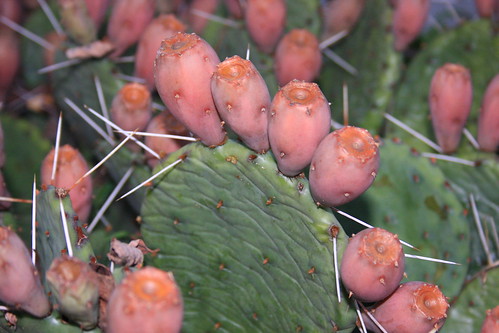
Eastern Prickly Pear Cactus (Opuntia humifusa).
(*photo credit)
November 23, 2013 Wage Theft: A Modern American Blight
Injustice to workers in the form of wage theft comes in a variety of ways and is still a major problem after all the enlightenment of modern industrial relations. Why? Because this injustice allows money for profiteers who can get away with it. Many of the post Great Recession job slots are lower paying and subject to a variety of work-place abuses: temporary jobs, lack of health benefits, unsafe working conditions, lack of alternative employment opportunities, etc. For those of us engaged in Reclaiming the Commons this is a major focus area:
------------------------------------------
Two unequal parties may be coerced by the more powerful to trade "freely," but the result will not be fair trade; power has an advantage over the other and freedom is compromised. Commercial activities are now globalized; injustices to workers in rapidly emerging nations are similar to those noted in earlier Western European and North American development periods. Corporate outsourcing, unsafe coal mines, failure to pay workers, escape industries, and repression of the right to organize are all part of the infringement on the rights of people to find and retain decent working conditions. A world of surplus potential workers is opening itself to bargaining for the lowest wage to the great disadvantage of all workers. The bottom 80% of Americans now loses a collective $743 million a year thanks to slow wage growth. The top 1% gains $673 billion.
Longer-term unemployed bear an unjust stigma -- for it renders some and especially older people unemployable. Why does one with the privilege of wealth have a right to deny another who is less privileged the right to a livelihood? Over a waiting period without work in this dysfunctional economy, the unemployed become virtually unemployable. Cynics speak today about unemployed middle management as the BWM or "beached white male." During and after this Great Recession unfortunate persons with longer unemployment are being discriminated against when competing against workers, especially in other countries who are willing to work for much reduced wages. Thus begins a downward spiral of competing workers who bargain down with others for scarce positions.
-----------------------------------------
Worker justice is challenged by advocates committed to social justice. Interfaith Worker Justice <www.iwj.org> and state affiliates is a leading group seeking to address this issue. The witness of everyday workers standing up to unscrupulous employers is documented in a report by IJW and Fe y Justicia entitled Wage Theft Comics and available in both English and Spanish. For orders, email cjunia@iwj.org. IJW focuses much attention in recent years on the plight of Walmart workers seeking to improve wages and working conditions and to create a respect for the dignity of work.
Prayer: Lord, keep us concerned about the conditions of our fellow un- or underemployed brothers and sisters.
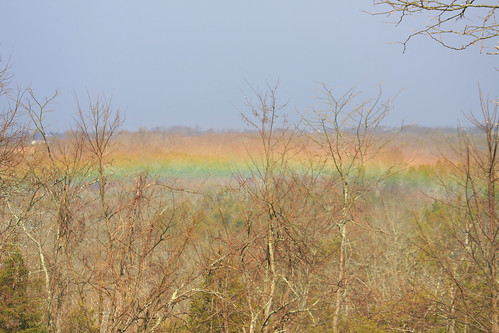
Brilliant rainbow in autumn forest.
(*photo credit)
November 24, 2013 Christ the King: Monarch and/or Servant?
Jesus, remember me when you come into your kingdom.
(Luke 23:42)
Each year on the Feast of Christ the King we ponder the choice of serving either a worldly king, ruler or system, or serving in the emerging "kingdom of God." Our choices are stark for we can either give allegiance to a prosperity "christianity" of possible material success and fame, or follow in spiritual service to the Lord and servant of all. Fortune and fame are certainly alluring for those who have experienced want and being marginalized by the wider society. But is this really worth striving for?
The opposite of this allurement is the side of Christ who is a king upon a cross. We know that Calvary is not a palace, the cross not a golden throne, and thorns hardly a proper crown. The contrast hits us hard, for Jesus tells us that we are to follow him wherever he goes. The fact that at times so-called Christians seek to imitate the opposite imperial sense of power and grandeur must be acknowledged -- and rejected. At his moment of infamy, Jesus is still a king and he refuses to let the world define his leadership differently. Jesus is telling us that true kingship and authority means service that is not easy to give, a raw touch of a reality that includes accepting risk, rejection, and ignominy. No, that offer is hard to take for it makes us empty ourselves of false pretensions about fame and fortune.
Choices stand before us. A kingdom where power overwhelms the lowly and they are led through the whip to follow a leader is certainly part of history -- and not desiring repetition. Authoritarian rule has been tried many times, but hardly includes a freedom exercised by subjects to such a reign. Kings can rule and they can rule. A totalitarian rule exudes false power, restricts freedom of all, and leads to violence in attempting to overthrow such a system. It can even entice some to follow.
The kingdom of Christ stands in opposition for it offers the free choice for each of us to say "yes" to a life of service to the Lord. It is more than assenting and saying yes, for that takes little effort; rather, the affirmative involves sweat and blood demanded of the entire life of serving the needs of others -- but done out of love and mercy. All this is contained in the "yes" of our Baptismal Vows, to avoid sin and its glamour, and to stand or even be nailed with Jesus at Calvary. However, it is in turning a yes into service that a new and just kingdom of Christ can become a reality. The new kingdom is in the process of being built, but it offers eternal promise of justice and peace. New motivations are called for; new strategies to be tried; and we are given a very personal invitation. Will we accept?
Prayer: Lord, help us in the depths of our freedom to choose to be with you on Calvary doing sacrificial service for others.
Direct us in refashioning kingship to your image.
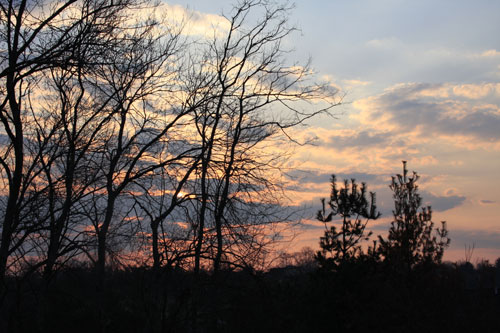
Autumn sky, approaching meteorological winter in Kentucky.
(*photo credit)
November 25, 2013 Church As Promoter of Economic Development
Preaching a Gospel of social justice in matters of economics is most challenging. Business leaders and promoters say that the Church should stay out of economic matters for they (the commercial world) know best from practical experience. However, when the Church is silent about unjust economics, it appears to confirm the status quo; when bad economic practice is exposed, the status quo is threatened and those with economic and political power do all they can to restrict any form of change. The challenge is intensified because Church physical institutions depend on finances from those who may be involved in suppressing any true change -- economic power exerted by financial donors. The hand that feeds is the hand wanting to keep feeding -- a silent and accepting Church fostering patience, tranquility, and personal piety. Business expects the Church to play by business rules and nothing more.
However, current events presents a mixed picture of growing inequality between rich and poor, first foisted by an industrial revolution including a pool of the unemployed and then by a financial revolution with its own growing inequalities. Such conditions are accompanied by overuse of drugs, alcohol, and domestic discord and the blaming of the impoverished on their sad condition through misconduct. This treatment of the poor as cause of poverty has died down but still persists among some individuals who defend the so-called advantages of excessive wealth.
Part of the decline of "poor as cause of their poverty" are new theories of poverty that counter the notion that the poor are better off staying poor -- and that economic activity builds on the ready pool of poor folks. In the place of such cruel concepts of society comes more recent understanding that sound economic development rests on raising economic health of the entire community from bottom up. The key to economic prosperity among poorer nations is verified by elevating the poor out of poverty and bringing them into the main stream ASAP. Martin Ravallion, The Idea of Antipoverty Policy, NBER Working Paper # 19210, July 2013.
To withstand the temptation to remain silent requires spiritual stamina and a spirituality of social justice that is willing to take risks, even of impoverishment for the sake of the Gospel. Some economic programs are more or less neutral and the Church is quick to support those seeking fair trade programs or building of cooperatives in a particular region. However, what about a fundamental change of a global system that is becoming more and more dysfunctional due to problems associated with globalization (escape industries to lower wage scale places and bidding down of safety and environmental issues)? See Chapter Eight of Reclaiming the Commons, Brassica Books.
Prayer: Lord, embolden us to speak out forthrightly about economic development issues and to do so with charity and with the needs of the poor in mind. Help us to be willing to call for fair taxes, global financial regulations, and a new social order.
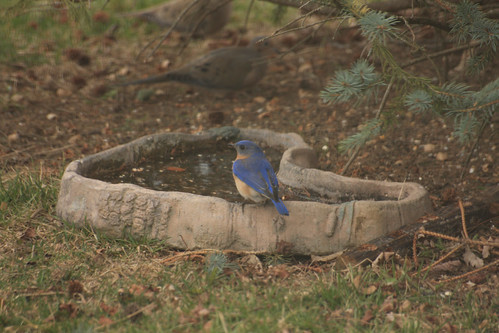
Eastern bluebird, Sialia sialis, at late-autumn bird bath.
(*photo credit)
November 26, 2013 Simple Living as Testimony to Sharing
The lessons from Pope Francis to live simply in lodging and transportation are not lost on those who struggle for their daily bread, as well as those who know the current economic order has serious flaws. In a world where higher prosperity drives some to compete and win for choice positions and fame, the material allurements are counter to simple lifestyles. This is true no matter how multiple the reasons for living simply are enumerated. In fact, we have on occasions listed many of these motivational reasons such as physical, psychological, economic, ecological, and spiritual ones. The benefits of many of these are immediately seen and thus the emphasis on shorter range benefits results.
A longer range benefit is the powerful witness for the poor by living simply. The effects resulting from imitating Christ are not seen in a day but over a longer lifetime; it is more than momentary self-denial but embraces a life time of service for others. The commitment to lifetime service comes as an expression of loving God with everything we have at our disposal. It involves a rejection of prosperity as proposed by material affluence, the itch to buy and to consume, and the appearance of wealth. The road to complex lifestyles with credit cards and indebtedness is paved with ready cash that needs to be spent. Saying "no" to such impulses is key to longer range living simply and sharing with the needy.
Simple living has is own inner dynamism that may require us to express ourselves through dramatic action. In fact, simple living allows freedom to act when something must be done -- and affluence holds us back. Agents of change transform simple living into simple focus with clear goals. The picture is stark to the simple living soul. However, we need charismatic agents of change along with rank and file followers willing to live the virtues of simple living for all, not just those committed to passive practice. Our world needs a simple lifestyle for the benefit of all. Being Christlike means acting when acting is needed. Changing from a material culture of grabbing and acquiring to one of restraining and sharing is revolutionary. To speak and act as and for the poor can only be done if we are able and willing to be poor in spirit.
Again, those living simply are not beholden to the rich, and thus are free to do more than speak freely in general terms; the ones who live simply can act simply. These do not have such baggage to allow them to be encumbered by the weight of material things holding them down. We cannot mince words and speak bravely without being willing to put ourselves on the line, even at great expense. Those living simply ought to discover their freedom to undertake radical action when this is called for, and they are more able to do this than when practicing in an affluent manner. The Christian must be liberated from allurements of materialism and must regard the simple life as the passport to profound change.
Prayer: Lord, teach us to simplify our way of living so we are more free to witness to the truth and to follow you when called.
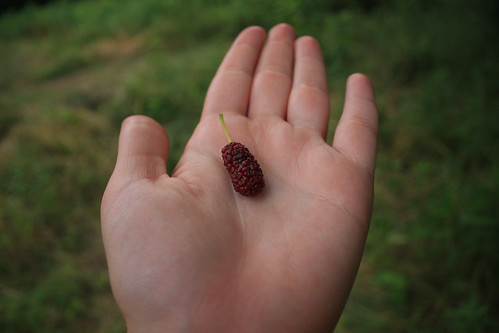
Memories from warmer days, ripe mulberry.
(*photo credit)
November 27, 2013 Food: Quantity, Quality, Safety, and Access
The environmental theme for this month is food, and so we seem to detour from energy issues for a time, or is that the case? Good nutritious and safe food gives energy to carry on our daily tasks.
Quantity -- We have much to be thankful for tomorrow and every day of the year. Whether we are urban or rural, we are aware that God gives us a harvest season of plenty that has just been completed, and that the barns and storage bins are almost overflowing this year with the largest corn crop ever recorded. Hopefully, this abundance of grain and soybeans as well can be used properly for the benefit of all people.
Quality -- We think about the quality of our meal tomorrow with turkey and its trimmings, cranberry sauce of a variety of fixings, vegetable side dishes of a family sort, and desserts of pumpkin, apple and other pies and sweets. The quality of this typical American ritualized meal is of prime importance for the celebration of the holiday. We need times of special feasting when food quality means much. This makes us thankful for the caregiving cooks who prepare these meals. Likewise, we look beyond Thanksgiving and ask ourselves about the types of food we choose for our diets -- how nutritious are they?
Safety -- Every item we buy and all the things we grow demand care and safeguards for those who will consume our food; this is taken for granted. Open a package and we assume the food is good or else it would not have been sold, and that is a prior commercial commitment of trust. But many factors brought this food through multiple production, transportation, and commercial systems. We give thanks for producers and processors, and for the conscientious overseers of food safety systems which furnish nutritious food.
Access -- There is bounty out there but, unless it is properly distributed, it remains excess for some and need for others. No other commodity makes us as aware of the disparity of wealth in our world as plenty and lack of food. Social justice clings to food as a delivery package as much as does food quantity, quality, and safety. Yes, we ought to enjoy a Thanksgiving dinner tomorrow, but let us resolve to be mindful to make surplus food available to all, for more than one day a year. Let's give thanks to God for those in the community who help make food accessible to all.
Finally, our thanks for food and service personnel becomes a Eucharist, which means Thanksgiving. This sacrament is the precursor of the heavenly banquet, the foretaste of things to come. In receiving this Holy Communion we become more aware of God's generosity to us and that we help in multiplying the loaves by insisting that no food is wasted and that surpluses go to those in need. Yes, make this Thanksgiving a truly spiritual one.
Prayer: Lord, give us this day our daily bread and prepare us
to receive it with a thankful and generous heart.

Thanksgiving blessings to share.
(*photo credit)
November 28, 2013 Answering a Crisis in Gratitude by Simple Thanks
Today's reflection was rewritten several times and for a reason. We know that many people fail to say thanks and take far too much for granted -- and this applies to some degree with all of us. But what is the response and can preaching be the proper tone on a day like this special one? While thanks is always at the tip of our lips, still today is one when we verbalize it in a most public manner. Only by simple thanks can we have a contagious message that others will want to follow.
* Thanks Lord for leading us out of the Great Recession and that many are able to get the essentials of life.
* Thanks for the largest corn crop on record and we hope you inspire the custodians of this bounty to use it wisely.
* Thanks for a spirit of comfort, though we know we have much more to do to see this as a gift from you.
* Thanks for allowing us not to see this as my own blessing and the fruit of hard work, but a success that you give us.
* Thanks for overcoming the temptation of our own glory apart from you and absent of any spiritual generosity.
* Thanks for good food and companionship, for people who cook and bring the food to us, and for the security and peace offered.
* Thanks for the spiritual insight to see that our imperfections have been forgiven and you still show us mercy and love, and that you inspire us to do the same.
* Thanks for good government that needs many improvements, but we have the room to help make them through your energy and grace.
* Thanks for the energy it takes to say thanks publicly and to ask others in a simple way to do the same.
* Thanks for Francis coming into our midst this year and giving your Church a need and ever deepening spirit of simplicity.
* Thanks for being patient with our nation in its efforts to bring stability to a torn world.
* Thanks for the growth of renewable energy applications so that our world will be spared the risks of severe climate change.
* Thanks for letting us see that the agenda is unfinished and that we are learning to be ever more hospitable for those who are undocumented in our midst.
* Thanks for the insights to allow prisoners who have minor records to perform community service.
* Thanks for life and breathing and the time it takes to pause and say thanks.
* Thanks for simple things we so often forget to notice: refrigeration, microwaves, potable water, electricity, and alarm systems.
* Thanks for open churches and faithful congregations and for faith to believe in new life.
* Thanks for friendly smiles and those who call you honey even though they may be suffering within themselves.
* Thanks for traffic lights and police, for careful bus drivers and courteous waitresses.
* Thanks for the senses of seeing, hearing, tasting, smelling and touching, especially on Thanksgiving Day.

A ripple effect.
(*photo credit)
November 29, 2013 Spread the Message: Buy Nothing Day
"Black Friday" is regarded as a duty by some of us. Before the turkey digests, some grab credit cards and rush to the shopping center. For those inspired by the sound of the rushing wind of commerce but do not want to drive, an electronic device at hand can launch the on-line spending venture of this holiday season. Giving thanks was nice yesterday but holiday getting seems better than giving, even getting into the shopping rush. Those with a touch of cynicism may add that cash or credit will see us through holidays.
Saying "no" to the consumer frenzy can best be accomplished by answering the word "save" on this or that item by buying nothing today. Then we really save. Certainly shop owners and workers look forward to today for it kicks off the final buying season of the year. How unpatriotic to also counter the binge with Buy Nothing Day. One response is that this is a personal matter, and stores can tolerate a few of us doing other things today. They expect us to spend time making a longer shopping list for tomorrow or next week.
The commercial world may be a little more disturbed because we are going beyond personal self-denial for a day and saying that others ought to join us in doing the same -- and so we spread the word -- "you all, buy nothing today." Really a single day of restraint may be extended to no purchases on Sunday or the "day of rest." If the old "Blue Laws" were reinstituted, then those who staff the stores could truly have time off for rest -- for they need it. The art of purchasing is quite involved, but the art of non-purchasing takes greater self-control and creativity. It may lead to sound budgeting and proper use of personal resources.
How about thinking up ways to occupy yourself on this day other than frequenting a local or on-line market place? Yes, think up forms of entertainment: games, books, social visits, outdoor exercise, and on and on. It is still the Thanksgiving weekend and well worth additional thanks to God for all good gifts bestowed. Rest your weary bones or exercise unused muscles, talk to guests, snooze, stroll, watch a game, see a movie rented earlier, or spend time with those around you. Just don't make purchases, if that is possible. And get others to do the same.
No doubt, consumers have become wiser during the Great Recession. Self-control has more followers, especially by those with limited budgets. Watching pennies means allaying the consumer spending impulse. We Americans watch in horror as other consumer nations enter the buying craze that takes a toll on environment, atmosphere, threatened plant and animal species, and the quality of life on this planet. The world cannot afford another consuming U.S. Let us Americans be the first to stop shopping until we drop; invite others to join the anti-consuming league.
Prayer: Lord, as we approach Advent teach us the virtue of
self-control and help us begin with how we act today.
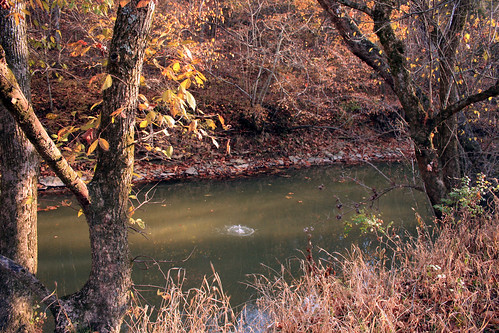
Autumn view of Thompson Creek, Anderson Co., KY.
(*photo credit)
November 30, 2013 Prepare for Advent Blessings
Advent is a season of minor self-denial in preparation for the upcoming Christmas event. Today in America this period is part of the "holiday season" stretching from Thanksgiving to the end of the year and beyond. Often holiday and self-denial do not go together.
Self-denial is a practice worth welcoming for we need it very much. Yes, this is the first blessing of Advent. Self-denial is not part of the national lexicon, for our national economy of consumerism is at stake, but why not rethink our spending habits? Self-denial is physically, emotionally, economically, intellectually, and spiritually healthy; it gives our stomach a rest; it saves on the budget; it relieves stress; it calls into question materialism in all its forms; and it opens our minds and hearts to the coming of the Lord.
Anticipation in a spirit of hope is the flavor of the season. We are awaiting something or someone more and we sense our wants. Advent makes us aware that there is far more in store, and thus we look to the future for development, growth, security, and happiness. For those with no advent, tomorrow will only bring in its petty pace from day to day -- and little more. On the other hand, Advent enhances our enthusiasm for spiritual things to come, for the Lord who is coming in the finality of events.
Will power to say "yes" or "no" and mean it for self or for others is a good that comes from the combination of self-denial and hopeful anticipation. As individuals, we need the period to be able to come to better self-control in everything from food choices to time spent in recreation. At a time of budget control, tax reform, and better migrant policy we are enabled to pray that our nation takes on these policy issues with a willing heart.
Taking stock of our lives makes Advent a blessing, for this needs to be done as an end of the year exercise, and we hate to do this at the very end of the year when we have other things on our mind. Furthermore, Advent is a proper time span at the beginning of a new Church year. Taking stock spiritually is of greater importance than budgeting on material things -- though that is time well spent also. How often do we pray? Are we mindful while praying? Do my prayers concern myself only or others as well?
Sharing with others is a product of this season. So often we engage in self-indulgent ways that crowd out the essential needs of the poor and those with greater problems than our own. The combination of self-denial and growth in will power allows us to break away from self-interest and turn to the public interest in our family, local community, and national lives. In Advent, let's resolve to reach out to those often overlooked and find a way to communicate with them in a meaningful manner.
Prayer: Lord, come soon and allow us to anticipate your coming with proper exercises during the upcoming blessed season of Advent. |

